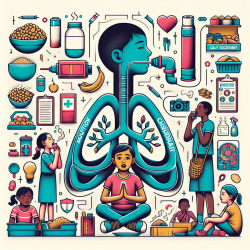Asthma is the most common chronic disease affecting children in the United States. Recent research highlights a concerning link between household food insecurity and the development of asthma in school-aged children. Understanding this relationship is crucial for practitioners aiming to improve child health outcomes. The study "Timing of household food insecurity exposures and asthma in a cohort of US school-aged children" provides valuable insights into this connection.
The Study: Key Findings
The research conducted by Mangini et al. (2018) utilized data from the Early Childhood Longitudinal Study-Kindergarten (ECLS-K) cohort, which followed children from kindergarten through eighth grade. The study found that exposure to food insecurity in early childhood significantly increased the odds of developing asthma later in childhood. Specifically:
- Food insecurity in the year before kindergarten was associated with an 18% higher likelihood of developing asthma by third grade.
- Food insecurity during second grade was linked to a 55% increase in asthma risk by fifth or eighth grades.
The study underscores the importance of identifying periods of vulnerability where interventions could mitigate long-term health risks associated with food insecurity.
Implications for Practitioners
Practitioners working with children can leverage these findings to enhance their practice in several ways:
- Screening for Food Insecurity: Regularly assess food security status during pediatric visits, especially during key developmental stages such as before kindergarten and around second grade.
- Intervention Programs: Collaborate with community organizations to provide resources and support to families experiencing food insecurity. This can include access to nutrition assistance programs and educational workshops on healthy eating within budget constraints.
- Holistic Care Approach: Consider the broader social determinants of health when diagnosing and managing asthma. Addressing underlying issues such as food insecurity can lead to more effective treatment plans.
- Advocacy and Research: Encourage further research into the pathways linking food insecurity and asthma. Advocate for policies that support comprehensive child health programs addressing both nutritional needs and chronic disease management.
Encouraging Further Research
The study by Mangini et al. opens up avenues for further exploration into how early-life exposures affect long-term health outcomes. Practitioners are encouraged to stay informed about ongoing research and contribute to studies that seek to deepen our understanding of these complex relationships.
To read the original research paper, please follow this link: Timing of household food insecurity exposures and asthma in a cohort of US school-aged children.










